
| WWT Shows | CLICK TO: Join and Support Internet Horology Club 185™ | IHC185™ Forums |

|
• Check Out Our... • • TWO Book Offer! • |
Welcome Aboard IHC185™  Internet Horology Club 185
Internet Horology Club 185  IHC185™ Discussion Site Main Page
IHC185™ Discussion Site Main Page  Horological Discussions, Questions and Answers
Horological Discussions, Questions and Answers  Pocket Watch Discussions
Pocket Watch Discussions  Crying shame or not? The truth is now known.
Crying shame or not? The truth is now known.
 Internet Horology Club 185
Internet Horology Club 185  IHC185™ Discussion Site Main Page
IHC185™ Discussion Site Main Page  Horological Discussions, Questions and Answers
Horological Discussions, Questions and Answers  Pocket Watch Discussions
Pocket Watch Discussions  Crying shame or not? The truth is now known.
Crying shame or not? The truth is now known.Go  | New Topic  | Find-Or-Search  | Notify  | Tools  | Reply to Post  |  |
| IHC Member 1101 Site Moderator |
While going through my collection and putting it into a database for quick reference I came to my 19 jewel Bunn 60 HOUR collection and made a very scary and disguntling discovery. Sometimes you take things for granted and this was a clear cut case of this. The watch shown is clearly marked as a Type I 60 HOUR as you can see as the only designation being the "MOTOR BARREL 60" to claim this. They are also the rarest of the three types. However, the serial number, 4726079 falls into the Type II category listed in the Meggars Illinois book. So is this: 1. A parts watch disguised as a Type I to increase it's value? 2. A missprint in the Meggars book? 3. A fluke of manufacturing error done at the plant during marking and assembly? I guess I will have to send this to Chris to be verified. If the train bridge numbers do not match I will be very, very, very, dissappointed. Steve  | ||
|
| IHC Life Member |
Steve, Two things poked me in the eye with this nice 19 Jewel motor barreled Illinois watch; The black lettering on plate with "Bunn" markings vs red lettering on the Motor Barrel markings plate. The Gold Gooseneck regulator spring. I hope that it is at least mostly matching s/n's to the barrel plate because that makes it at least original to that rare production. The Regulator can be polished off or replaced. My "Illinois Bible" says for this s/n; 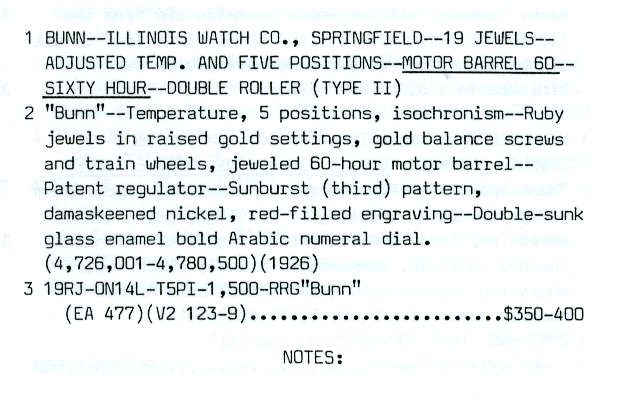 | |||
|
| IHC Life Member |
Also, as this is number 72 of the first run, M-A-Y-B-E the wheel bridge plate is matching but w black lettering. Here's my red lettered 19J bunn to help compare. 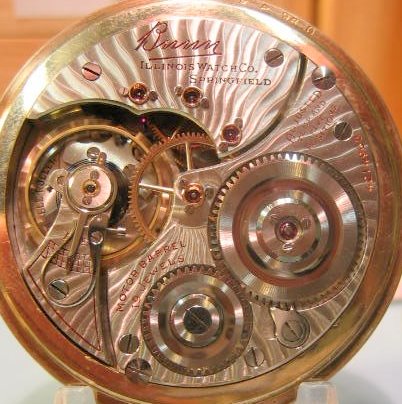 | |||
|
| IHC President Life Member |
Steve, Perhaps it would help if you clear up whether the lettering is mismatched or if we are simply seeing reflections of ambient light, color and shadows. Even if the lettering color does not match you watch may still be genuine, after all there has been more than eight decades for various owners and service professionals to "touch-up" the colors. Now to the numbers, we must always keep in mind those marginal notes are just that, notes based mainly upon observations and educated guesses. Although there are also factory references in the mix those notes are not necessarily accurate. And as Dave pointed out the movement in question is the 79th into a run, that is important to consider. All too often we assume the factory did a clean break from one movement variation to another at the beginning of a run. Not so, in fact they did not even produce movements in chronological order, they can literally be "all-over-the-map" overlapping of the numbers and types, so do not be confused by them. Here are two examples you might find interesting. Look up both 5421606 and 5421640 in the Illinois Encyclopedia, second column on page 416 and see what is in the marginal notes! The marginal notes say those may be "Type I & Type IE" but they are not! Go to our "Bunn Special 163, 163-E, and 163-A "The Seven Stars" Database and look up both those numbers. Interestingly 5421606 is a Type II Elinvar not a Type I or Type IE and get this... 5421640 is the exceptionally rare Type II not a Type I as is suggested in the marginal notes. Steve, this does not prove or disprove your movement, only a disassembly will be definitive. What it should do however is cause us to always keep an open mind... "If in doubt, check it out" ...comes into play. Lindell Type II Elinvar and Type II unlike suggested in the notes... 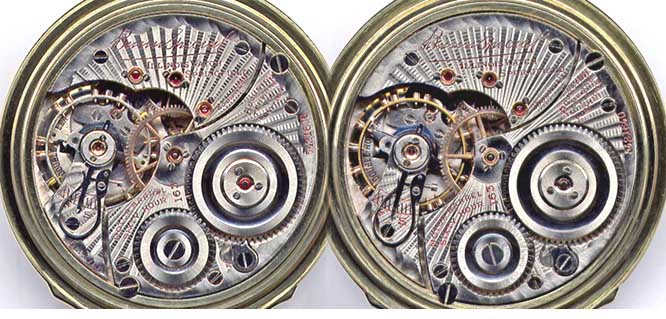 | |||
|
| IHC Member 1101 Site Moderator |
Lindell, Great information and proof that strange things can happen in this wonderful hobby of ours. I also see the Elinvar version has a lower number than the non Elinvar....makes you think that was some what unusual as well. As for my situation, I am not experienced enough to pull this watch apart to verify the numbers. What I can do is remove the dial and check the numbers on the pillar plate but that is the extent of my expertise. If they do match, and if Dave would be willing to remove the train and balance bridges to check the numbers I would be willing to send it to him postage paid both ways. I am not asking for a free cleaning here, just to try and answer some questions on possibly why some things were done the way they were. Steve | |||
|
| IHC Member 1101 Site Moderator |
Well I just removed the dial and the numbers on the pillar plate match so ....so far so good. The mystery continues. Steve | |||
|
| IHC Life Member |
Steve, I will look at it for you. Send it to; Dave Abbe Glopar Inc. 1025 Vernon Way El Cajon, CA 92020 any questions? weekdays (619) 596 1660 10 AM - 5 PM Pacific. | |||
|
| IHC Member 1101 Site Moderator |
Dave, I appreciate it. I will get it packed up tonite and on its way to you tomorrow. Steve | |||
|
| IHC Life Member |
Steve, I just finished up the "inspection", and (could not resist the opportunity to ) cleaned up the watch.  | |||
|
| IHC Life Member |
It runs pretty accurate for an "old guy"! That is "plus 0.8 seconds per day". (I have to admit I backed out the mean time screws 1/2 turn before it came into these numbers.) 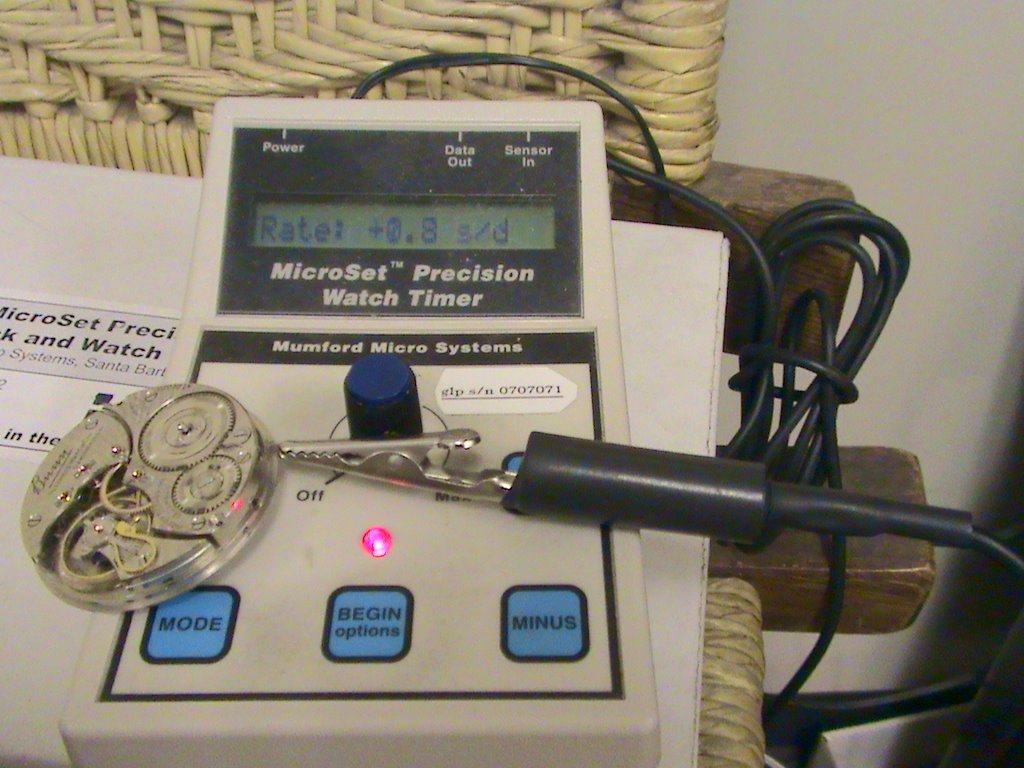 | |||
|
| IHC Life Member |
All the numbers match the main serial number 4726079 from the main barrel cover to the top Barrel arbor pivot jewel plate, and . . .  | |||
|
| IHC Life Member |
The (clockwise from upper left) Pillar plate dial side, Bottom of Barrel cover, Balance Cock, Balance wheel, and . . . .  | |||
|
| IHC Life Member |
(from upper left) Train Bridge, Pallet fork bridge, motor barrel cover, and motor barrel!  | |||
|
| IHC Life Member |
and I had to change only 1 part. When it came, the middle Barrel Bridge screw had been "pre-empted by a case screw, so I replaced it with a bridge screw.  | |||
|
| IHC Life Member |
Steve, in short you have a real winner, it's rare, collectible, and runs like a champ! | |||
|
| IHC Member 1101 Site Moderator |
Fantastic Dave, The images are awesome. A sigh of releif came over me as I viewed these pictures and saw all the numbers matching but so did a number of questions. I am curious to know if there were some actual Type II's that were numbered prior to this one, a Type I. Just so strange it could be out of sequence but on the other hand, it may very well have been a continuation of the Type I and the Type II started a little later than the Meggars book declared. Here is possibly another case of the factory using parts that were available to them at the time which would explain the black enamel used in the lettering on the train bridge and red everywhere else or, an error in the Illinois book with which the Type II didn't start until serial number 4726080 or later. Whatever the case, this watch is a complete Type I and in wonderful condition. As per Dave's request, a donation will be made to IHC185 for his troubles as well as my peice of mind. Just as a side note....this may be the highest numbered Type I known (I am forever the optimist). Steve | |||
|
David, Thanks for some great pictures and info. I had no idea how many parts were numbered, both scratched on and stamped. It's fascinating. Is that common to all pocket watches of the era? -Tom O. | ||||
|
| IHC Member 1101 Site Moderator |
Thomas, In my conversation with Dave he seemed amazed that so many of these parts had the serial numbers scratched in including the Barrel arbor pivot jewel plate which is only about 3/16 on an inch in diameter. It may have been an Illinois procedure and might not have been used across the industry. Steve | |||
|
| IHC Member 1016 |
That's really great news Steve. "How do YOU spell relief"?!!!!!!!!! | |||
|
Excellent job David, great cleanup as well, looks like new.. A real nice watch there Steve Ray | ||||
|
| IHC Member 1101 Site Moderator |
Mike, Initially I could only think of the worst but after reading Lindells post I did feel a little bit at ease. I think I now spell releif as "Thank you Dave". When a dilema like this turns up it really gives you a little better understanding of how things got done in those days. To me, the mechanical pocket watch was engineering marvel and the quality of craftmanship that went into these 80 plus year old watches is truly amazing. Dave did not do much more that clean it and reassemble it and it runs to within .8 seconds per day and I just love to take the backs off these and watch them go. If a few more of these turn up we can learn even more. Thanks for all the kudos as well, Steve | |||
|
| IHC President Life Member |
Thanks a million to Dave Abbe, he did a great favor for all of us! You demonstrated our hobby is about unselfish sharing of knowledge and helping each other. Among the several truths demonstrated in this topic is the fact they really did not finish these watches in chronological order, none of the companies did. The more we learn by collecting numbers and other data the more this important fact sinks into our collective judgement. This topic also helps those who may never take a movement apart to realize the amazing attention to marking nearly every part for their precision fit. Yes, even the Motor-Barrel Jewel Setting was hand scribed with the last four movement number digits. Another point driven home in this topic is the fact "higher-jeweling" above 17 or 19-Jewels added nothing to the performance of Railroad Grade Timekeepers. Look at the capacity for amazing accuracy demonstrated by that 19-Jewel Bunn Compare these prices very carefully... 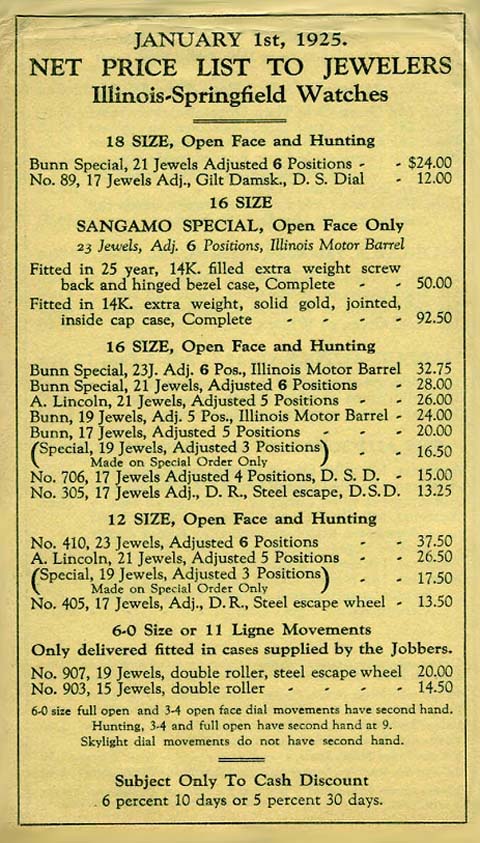__.jpg) | |||
|
| IHC Life Member |
Lindell, Thank you for the extra information. It is interesting that the 12 size 23 Jewel 410 is the most expensive of the bunch. Says something for 1925 watch buying trends. To "wrap this up", I must admit a somewhat unsettling discovery with Steve's watch. If you note there are some small score marks on the spokes of the center wheel, that are even visible on Steve’s first picture. Well, after all the fun of cleaning lubing, and timing the watch, I went away, and came back to find the watch had stopped! Very careful inspection showed that the main wheel had been actually bent out of square and also slightly conical at the same time so that every 1/2 hour it would contact the motor drive wheel just above the gear teeth, causing it to stop. I brought in the "master", Mr. Vladimir on this, and we very carefully trued the main wheel, and re-polished all the pivots, whether they needed it or not. So now it is happily ticking it's way back to Steve, who I hope will enjoy being it's caretaker and use it from time to time (yes they do like to be carried!) I had taken a "family portrait" of the wheels, and below is the picture I sent Steve, showing him the mysterious markings that occurred when the wheel had been distorted. 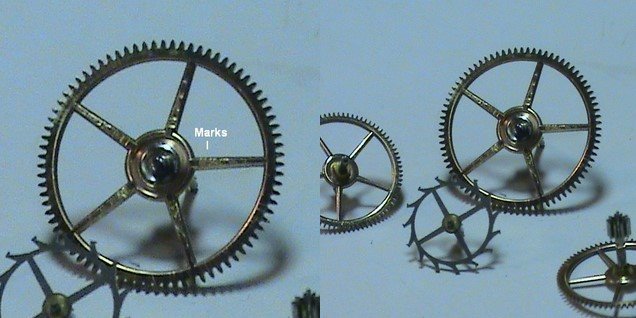 | |||
|
| Powered by Social Strata |
| Your request is being processed... |
|
Welcome Aboard IHC185™  Internet Horology Club 185
Internet Horology Club 185  IHC185™ Discussion Site Main Page
IHC185™ Discussion Site Main Page  Horological Discussions, Questions and Answers
Horological Discussions, Questions and Answers  Pocket Watch Discussions
Pocket Watch Discussions  Crying shame or not? The truth is now known.
Crying shame or not? The truth is now known.
 Internet Horology Club 185
Internet Horology Club 185  IHC185™ Discussion Site Main Page
IHC185™ Discussion Site Main Page  Horological Discussions, Questions and Answers
Horological Discussions, Questions and Answers  Pocket Watch Discussions
Pocket Watch Discussions  Crying shame or not? The truth is now known.
Crying shame or not? The truth is now known.©2002-2025 Internet Horology Club 185™ - Lindell V. Riddle President - All Rights Reserved Worldwide

